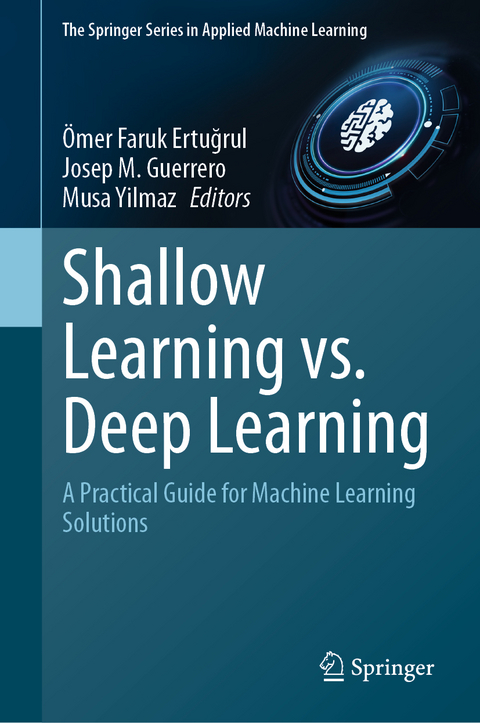
Shallow Learning vs. Deep Learning
Springer International Publishing (Verlag)
978-3-031-69498-1 (ISBN)
This book explores the ongoing debate between shallow and deep learning in the field of machine learning. It provides a comprehensive survey of machine learning methods, from shallow learning to deep learning, and examines their applications across various domains. Shallow Learning vs Deep Learning: A Practical Guide for Machine Learning Solutions emphasizes that the choice of a machine learning approach should be informed by the specific characteristics of the dataset, the operational environment, and the unique requirements of each application, rather than being influenced by prevailing trends.
In each chapter, the book delves into different application areas, such as engineering, real-world scenarios, social applications, image processing, biomedical applications, anomaly detection, natural language processing, speech recognition, recommendation systems, autonomous systems, and smart grid applications. By comparing and contrasting the effectiveness of shallow and deep learning in these areas, the book provides a framework for thoughtful selection and application of machine learning strategies. This guide is designed for researchers, practitioners, and students who seek to deepen their understanding of when and how to apply different machine learning techniques effectively. Through comparative studies and detailed analyses, readers will gain valuable insights to make informed decisions in their respective fields.
Omer Faruk Ertugrul, was born in Batman, Turkey in 1978. He received the B.S. degree from the Hacettepe University, Department of Electrical and Electronics Engineering in 2001, M.S. and Ph.D. degrees in Electrical and Electronics Engineering in 2010, and 2015, respectively. His research interests include machine learning and signal processing. He is in 100,000 top-scientists list in the world, %2 top-scientist list in the world, in Turkey Top 10.000 Scientists, and in AD Scientific Index - 2022 Turkey Top 10.000 Scientists, in 2019, 2020, 2021, and 2022 respectively. He is currently associate editor in NC&A (SCI-E indexed-Q1) in Middle East excluding Iran. He is also co-founder/co-owner and CTO in INSENSE, ABRH and SOFTSENSE.
Josep M. Guerrero received his B.Sc. (1997), M.Sc. (2000), and Ph.D. (2003) in engineering from the Technical University of Catalonia, Barcelona. He is currently pursuing an M.Sc. in Psychobiology and Cognitive Neuroscience. Since 2011, he has been a Full Professor at AAU Energy, Aalborg University, Denmark, leading the Microgrid Research Program. In 2019, he founded the Center for Research on Microgrids (CROM). His research covers microgrids, IoT, cybersecurity, maritime and space microgrids, and smart medical systems. He is an Associate Editor for IEEE TRANSACTIONS and has over 900 papers with 117,000 citations. Recognized as a Highly Cited Researcher (2014-2022), he received the IEEE Bimal Bose Award (2021) and IEEE PES Douglas M. Staszesky Award (2022).
Musa Yilmaz received his Associate Professor certificate in Electrical-Electronics and Communication Engineering. He works at the University of California, Riverside, and Batman University. He received his M.Sc. degree from Marmara University, Istanbul, Turkey, in 2004, and his Ph.D. degree from the same institution in 2013. From 2015 to 2016, Dr. Yilmaz was a visiting scholar at the Smart Grid Research Center (SMERC) at the University of California, Los Angeles (UCLA). His primary research interests include smart grid technologies, renewable energy, machine learning, and signal processing. Dr. Yilmaz is a partner of the medical company Biosys LLC. He has served as Editor-in-Chief of the Balkan Journal of Electrical and Computer Engineering (BAJECE) and the European Journal of Technique (EJT). Additionally, he is the owner of INESEG, a publishing organization. Dr. Yilmaz has authored over 50 research articles, several book chapters, and frequently delivers invited keynote lectures at international conferences. He has also led his research team as the Principal Investigator in several European projects. He is an IEEE Senior Member.
Survey of machine learning methods from shallow learning to deep learning.- Shallow learning vs Deep learning in engineering applications.- Shallow learning vs Deep learning in real-world applications.- Shallow learning vs Deep learning in social applications.- Shallow learning vs Deep learning in image processing applications.- Shallow learning vs Deep learning in biomedical applications.- Shallow learning vs Deep learning in anomaly detection applications.- Shallow learning vs Deep learning in natural language processing applications.- Shallow learning vs Deep learning in speech recognition applications.- Shallow learning vs Deep learning in recommendation systems.- Shallow learning vs Deep learning in autonomous systems.- Shallow Learning vs Deep Learning in Smart Grid Applications.
| Erscheinungsdatum | 15.10.2024 |
|---|---|
| Reihe/Serie | The Springer Series in Applied Machine Learning |
| Zusatzinfo | XII, 274 p. 114 illus., 104 illus. in color. |
| Verlagsort | Cham |
| Sprache | englisch |
| Maße | 155 x 235 mm |
| Themenwelt | Informatik ► Theorie / Studium ► Künstliche Intelligenz / Robotik |
| Schlagworte | Alzheimer disease • Artificial Intelligence • convolutional neural networks • Deep learning • ecg • engineering applications • Image Processing • machine learning • Natural Language Processing • network anomaly detection • Object detection • Opinion Mining • Parkinson disease • Real-time Speech Recognition • Recurrent Neural Networks • sentiment analysis • Shallow Learning • Smart Grids • social network analysis |
| ISBN-10 | 3-031-69498-8 / 3031694988 |
| ISBN-13 | 978-3-031-69498-1 / 9783031694981 |
| Zustand | Neuware |
| Haben Sie eine Frage zum Produkt? |
aus dem Bereich


